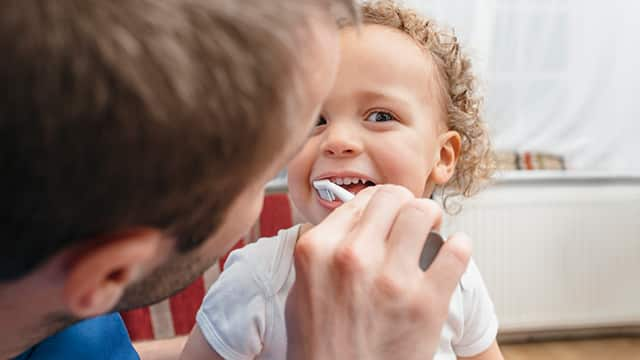Bad breath in toddlers can be worrying, and let’s be honest, sometimes a little surprising. One moment, they are all smiles, the next, you’re wondering how such a tiny human can produce such a big smell. While it’s often harmless, bad breath (or halitosis) can be linked to poor hygiene, dry mouth, certain foods, or even certain medications.
The good news, though, is that a few smart tweaks to their oral care routine and some clever snack swaps can make a real difference. Here are some common causes for bad breath with practical solutions to freshen your little one’s breath naturally.
Common Causes You Might Not Expect
Poor oral hygiene
If brushing and flossing aren’t done twice a day, food particles linger, bacteria multiply, and bad breath follows. Even toddlers need gentle brushing and gum care, and older ones need a reminder to floss daily. 1
Dry mouth
When saliva levels drop, the bacteria thrive. This can happen if your child isn’t drinking enough water. Without enough moisture, stinky breath is almost inevitable. 2
Mouth breathing
Seasonal allergies or a stubborn cold can cause kids to breathe with their mouths open, especially during sleep. This dries the mouth and temporarily fuels odor-causing bacteria. If your child has constant sinus issues, frequently breathes, or sleeps with their mouth open, their bad breath might persist or indicate an underlying problem.3
Medication
Some medicines release chemicals during digestion that leave a sour smell. Always scan the side effects of any medication your child takes. If you suspect medication is causing bad breath, identifying and addressing the problem may require a dental checkup at the doctor’s office, which usually involves a specific process.4
Bad breath in toddlers can be worrying, and let’s be honest, sometimes a little surprising. One moment, they are all smiles, the next, you’re wondering how such a tiny human can produce such a big smell. While it’s often harmless, bad breath (or halitosis) can be linked to poor hygiene, dry mouth, certain foods, or even certain medications.
How to Get Rid of a Toddler's Bad Breath
Start with a solid oral care routine
Floss daily (yes, even for little ones)
Keep them hydrated
Try a kid-friendly fluoride mouthwash
If your dentist gives the green light, a gentle fluoride mouthwash can help combat bad breath. Fluoride strengthens tooth enamel and reduces harmful bacteria, while a good mouthwash leaves your child’s mouth feeling clean and fresh6.
Practice good oral hygiene to eliminate a toddler's bad breath. Bacteria often cause bad breath and can usually be managed with proper dental care. Teach your child to brush their teeth twice daily and include tongue cleaning because that’s where odor-causing bacteria love to hide.5
Once two teeth touch, flossing should start. It removes debris that brushing can’t reach and keeps the gums healthy.
Water is your best friend for preventing dry mouth. It keeps saliva flowing, which acts as nature’s own mouthwash.
Snack Recommendations for Fighting Toddlers' Bad Breath
Some foods actually help clean the mouth while your child eats. Think of them as nature’s toothbrushes. Here are some snack suggestions:
Apple slices
Crunchy and full of fiber, fruits like apples and pears scrub the teeth's surfaces while stimulating saliva production, acting as a natural mouthwash. They’re sweet enough for kids to love, but still fight the bacteria behind bad breath.7
Carrot sticks & celery
Crunchy vegetables like carrots, celery, and kale are fibrous vegetables that can boost chewing time, which triggers more saliva production. They also gently massage gums, which supports overall mouth health. High-fiber fruits and vegetables rich in vitamin C can effectively reduce bad breath.8
Yogurt (unsweetened)
Plain yogurt’s probiotics can lower levels of hydrogen sulfide, one of the main causes of bad breath. Choose unsweetened yogurt, as added sugar might counteract this benefit and feed bad bacteria.9
Cheese
A calcium-rich snack that also neutralizes mouth acids. Great for teeth, and even better for keeping fresh breath.10
Berries
Blueberries, cranberries, and raspberries are packed with antioxidants that may help block bacteria from sticking to teeth. They may help prevent plaque and tooth decay.11
When to See a Dentist
Sometimes, home care isn’t enough. If bad breath persists despite regular brushing, flossing, and snack swaps, it could point to something more serious, like gum problems, tonsil stones, or tooth decay. A regular checkup with your dentist ensures any problems are caught early and helps reinforce good habits.
Frequently Asked Questions:
What vitamins help with bad breath?
Vitamin C and B-complex vitamins help fight infections and keep your gums healthy. Others, like zinc and copper, have antibacterial properties that can help control the growth of odor-causing bacteria.12
Can a dentist cure bad breath?
Yes, especially if gum disease or plaque buildup is the cause. A deep cleaning removes bacteria and helps prevent future issues like tooth loss.13
Does saltwater help with bad breath?
Swishing with saltwater stops bacterial growth, reduces plaque in your mouth, and can help you maintain fresh breath. This lowers your chances of developing a sore throat, bad breath, cavities, or gum disease. Mix ¼ to ½ teaspoon of salt into a cup of warm water and swish for 30 seconds.14






